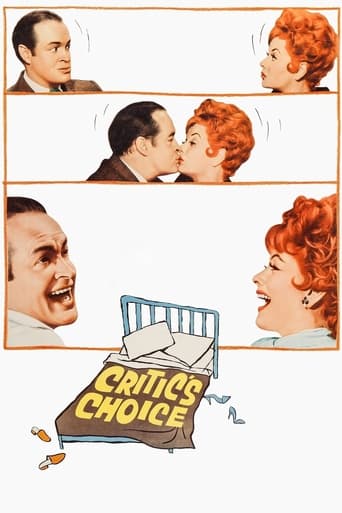vincentlynch-moonoi
Somewhere along the line, someone (perhaps himself) told Bob Hope that he needed to change his screen persona. Instead of being a bit of a bungler at life and love -- which was very likable -- he tried to become more suave and sophisticated. Mostly, in my view, that didn't turn out too well. In fact, despite another 8 films before his film career ended, this was the last that I felt was good...and I mean darned good. So why does it tend to often get poor reviews? Very simple. While there is humor in it, this film is really a drama (with the exception of the drunk escapade, where it -- unfortunately -- becomes slapstick). And that's not what most people expect from Bob Hope or Lucille Ball. Nevertheless, Hope could be quite good at drama (e.g., "The Seven Little Foys" and "Beau James")...and is darned good here. And Lucy wasn't really a comedienne, but rather a comedic actress...there's a big difference between the two. And here she does very nicely in what is pretty much a dramatic role.As I said, there is some humor here, but it's mostly a fairly dramatic story line about the wife of a critic who writes a play. Will it be good or bad? Will he or won't he review it? And if he does, what will be the consequences? Marilyn Maxwell has a part as Hope's ex-wife (incidentally, you might want to Google Marilyn Maxwell + Bob Hope). I kept trying to figure out who the director in the film was...not quite recognizable...turned out to be a very young Rip Torn...and he was appropriately slightly sleazy...and actually quite funny. Jessie Royce Landis was always a welcome addition to any film...and usually as the mother-in-law. John Dehner was good as a Broadway producer. And it was nice to see Jim Backus as a psychiatrist! Child actor Ricky Kelman did a great job, here! At least nowadays, it's pretty clear why this film gets some negative reviews. It's very sexist. The husband/critic constantly puts his wife down for her work on writing a play; he then savages the play in a review; and then puts her in her place -- bed, after which he reviews their love-making. Unfortunately, Bob didn't realize the times were changing.It's a mixed bag with some very good acting.
jefflrfe
The decor alone is worth the price -- I want to live in Hope and Ball's apartment!Maybe it's because I saw it at such a young age, but it's always been a favorite of mine. Good dialogue, great cast, and just a lot of fun. (Years later I worked with Soupy Sales and told him how much I'd liked his cameo as a desk clerk. He told me that he'd had no idea he was going to do the movie until he got a call from Hope the morning of the shoot asking him, "Wanna come out to Burbank today and do bit with me?")And to those reviewers who complain that Hope's character "walks out" on the show he's reviewing at the top of the film, there were no such things then as "critic's previews." Nowadays critics attend a production during the final week or two of previews and write their reviews at leisure, to be published the day after the official opening night.Back then, all the critics attended on opening night, and it was standard operating procedure to leave the theater in time to make it back to the paper to file the review before the deadline. It's not meant to imply that the character doesn't take his job seriously or is a "bad critic" as others have written. The only thing that's inaccurate about that part of the film is that in reality, ALL the other drama critics from ALL the other daily papers would have been "walking out" at the exact same moment to make the exact same deadline.
JasparLamarCrabb
Certainly not horrible considering the amount of junk Bob Hope appeared in during the 1960s. That said, it's no great shakes either. Hope is a NYC theater critic whose wife (Lucille Ball) decides to write a play. Hope, of course, is caught in a conundrum, unsure if he should support her endeavor or convince her to give up on it. It's only occasionally funny with Hope giving what amounts to an actual performance. Unfortunately, Ball is far too restrained and comes across as a bit dull. The supporting cast is pretty good, with Rip Torn as "Dion," the avant- garde stage director who takes on Ball's play (and provides a lot of fodder for the tart-tongued Hope). Jessie Royce Landis, Richard Deacon, Marie Windsor and Jim Backus are in it too. Marilyn Maxwell is funny as Hope's Broadway diva ex-wife. The unimaginative direction is by Don Weis.
Ripshin
I will assume that Ira Levin's original Broadway play was much better than this dull, tedious film. It has obviously been altered to fit the acting styles of Ball and Hope. Lucy's role comes across as a toned-down version of her Lucy-wants-to get-in-show-business character, and Hope hams it up as the husband. Scene after scene comes across as rather pedestrian. The sets and cinematography are fine, and Edith Head provides Lucy with great costumes. Perhaps fans of the then-running "Lucy Show" made this film a success. However, 1968's "Yours, Mine and Ours" is a much better vehicle for Ball, even if her advanced age made that role unrealistic. In retrospect, Lucy comes across as annoying and passive in this film. In addition, the child actor Ricky Kelman is extremely irritating as the son of Hope, and step-son of Ball.



